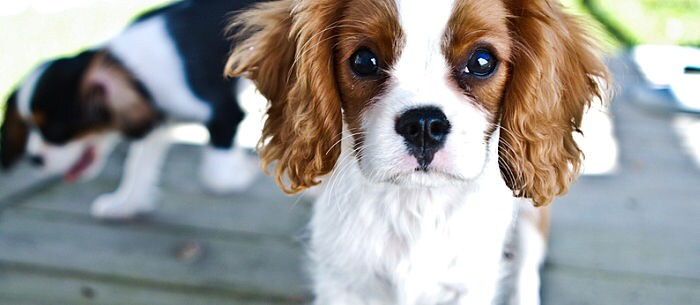We’ve all heard horror stories about flaky out-of-state dog breeders, irresponsible practices and puppy mills. But, of course, not all dog breeders are bad. “There are many small-scale, responsible breeders who take great care to breed only a limited number of healthy, well-socialized puppies,” says Kathleen Summers, the director of research and outreach for the puppy mills campaign at Humane Society of the United States.
But if you’ve made the decision to purchase a puppy from a breeder, how do you ensure you won’t end up with a bad apple? According to Dr. Sarah Bowman of CityPaws Animal Hospital in Washington, D.C., you’ve got more research to do. “Find friends, neighbors and veterinarians and ask for recommendations based on their experience with dog breeders,” she suggests.
And don’t stop there, says Summers. “Check with the local, state or national club that specializes in the specific breed — and visiting in person is also important,” she explains.
Here are 10 ways to know you’re working with a responsible dog breeder:
- They Are Very Knowledgeable About the Breed
Different breeds have different genetic predispositions, health concerns and personality traits — a good breeder will have vast knowledge about all those things. Summers explains, “A responsible dog breeder will only breed one or two types of dogs and will be an expert in that breed. They usually belong to a national breed club and may be involved in conformation events, obedience trials or other performance events.”
- They Will Have Proper Veterinary Records
“Good medical records should be available for all breeding animals and puppies,” says Dr. Bowman. And while the breeder should have a strong relationship with local vets, they should not require you to use one specific vet, but let you defer to your veterinarian, she explains.
- They Will Allow You to Visit
You need to ensure the facilities where the dogs are kept and bred are clean and spacious, and a responsible breeder will be more than happy to show you around.
- They Will Have Dogs Housed in Appropriate Quarters
Small dogs should typically be kept indoors, while larger sporting dogs may be kept outside with plenty of room to run.
- They Want to Meet You
Not only will responsible dog breeders invite you to visit, but they may even refuse to sell a puppy to someone they haven’t met in person. “A responsible breeder never sells her puppies through a pet store or ships them to unseen buyers (for example, via Internet ads). They will want to meet the families who are taking home their puppies,” says Summers.
- They Keep Happy, Healthy Dogs
Their dogs are well fed, clean, well groomed, healthy (no runny eyes or noses), socialized, well exercised and well provided-for. And, Summers advises, don’t focus solely on the puppies. “Always make sure the parent dogs look happy, alert and healthy, and are friendly and social,” she says.
- They Won’t Always Have Puppies Available
Most reputable breeders will not have a constant, unending flow of puppies available. They might keep a list of interested buyers to stay in touch with when a new litter of puppies is born.
- They Will Offer Support After You Take Home Your Pup
A reputable breeder wants your transition to go as successfully as possible, so they will offer guidance on care and training after your puppy goes home with you in an effort to ensure a successful family introduction. They will be concerned for the puppies’ welfare for life.
- They Will Provide References
Ask for references from other families who have purchased one of their puppies, and a good breeder will happily oblige.
- They Will Ask You Questions
According to Dr. Bowman, a responsible dog breeder will want to ensure you are the best potential owner for their puppy. “They should ask, ‘Are you prepared to have a dog? Do you have a veterinarian lined up and a first visit set up in the first week you get the puppy? Do you have any other dogs or pets at home?'” she says.A good breeder may also ask you to explain why you want a dog and who will care for it, to provide proof from your landlord that you’re allowed to have a dog (if you live in an apartment or condo) and possibly even to sign a contract that you will spay or neuter the puppy (unless you’ll be actively showing or breeding).
Not quite sure what to do with your new puppy once you get her home? Check out 8 Tips for Raising the Perfect Puppy.
Andrea Dashiell is a freelance writer whose work has been published in The Seattle Times, Seattle Magazine, ParentMap, Parents.com, DailyCandy and RedTricycle.



